I came across some weird behaviour when using GroebnerBasis. In m1 below, I used a Greek letter as my variable and in m2, I used a Latin letter. Both of them have no rules associated with them. Why do I get vastly different answers depending on what variable I choose?
Image:

Copyable code:
Clear["Global`*"]
g = Module[{x},
x /. Solve[
z - x (1 - b -
b x ( (a (3 - 2 a (1 + x)))/(1 - 3 a x + 2 a^2 x^2))) == 0,
x]][[3]];
m1 = First@GroebnerBasis[\[Kappa] - g, z]
m2 = First@GroebnerBasis[k - g, z]
EDIT:
As pointed out by belisarius, my usage of GroebnerBasis is not entirely correct as it requires a polynomial input, whereas mine is not. This error, introduced by a copy-pasta, went unnoticed until now, as I was getting the answer that I expected when I followed through with the rest of my code using m1 from above. However, I'm not fully convinced that it is an unreasonable usage. Consider the example below:
x = (-b+Sqrt[b^2-4 a c])/2a;
p = First@GroebnerBasis[k - x,{a,b,c}]; (*get relation or cover for Riemann surface*)
q = First@GroebnerBasis[{D[p,k] == 0, p == 0},{a,b,c},k,
MonomialOrder -> EliminationOrder];
Solve[q==0, b] (*get condition on b for double root or branch point*)
{{b -> -2 Sqrt[a] Sqrt[c]}, {b -> 2 Sqrt[a] Sqrt[c]}}
which is correct. So my interpretation is that it is OK to use GroebnerBasis in such cases, but I'm not all too familiar with the deep theory behind it, so I could be completely wrong here.
P.S. I heard that if you mention GroebnerBasis three times in your post, Daniel Lichtblau will answer your question :)